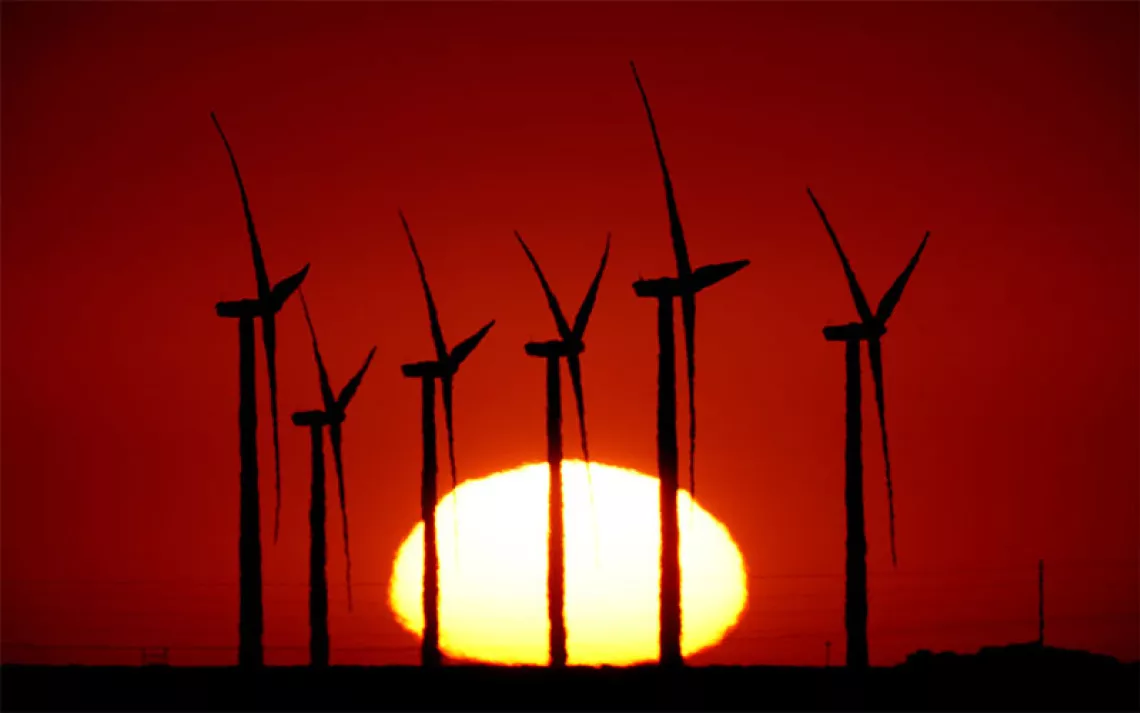A Door-to-Door Rooftop Solar Salesman Shares His Tricks of the Trade
Matt Fox says he loves knocking on doors. "It’s not like I’m pushing vacuum cleaners or encyclopedias."

Matt Fox goes door-to-door selling solar "power purchase agreements." | Photo by Carolyn Fong
Adapted from an interview with Matt Fox by Jason Mark.
I sell "power purchase agreements" for residential rooftop solar. A crew sets up solar panels on your rooftop, and then you just buy the power at a set rate per kilowatt. If you buy it from us, it's 19 cents per kilowatt, and we never raise the price. Utilities in California charge 31 to 32 cents per kilowatt for electricity in the highest-cost tiers.
I go door-to-door, and here's my pitch: "I just met with your neighbor, Bob, down the street. You might have seen our vans there, working on the power project. I'm sure you've seen a lot of solar panels going up. With this system, you don't pay for the equipment. Just let us set it up, and you get cleaner, cheaper electricity. You've got the real estate, and we've got the equipment. Let's pool our resources and split the money." If I can get someone to start asking me questions, there's a good chance that they will be my next customer.
People are always saying, "You go door-to-door. That sounds horrible." And I'm like, "No, it's a party." Once people realize I have the hookup for their family, they are like, "Come on in. Can I get ya a drink? Do you want some food?" It's not like I'm pushing vacuum cleaners or encyclopedias.
My whole working life before this, I did labor. Because I'm a huge guy, I never had to look for a job. I did construction. I did a lot of landscaping. Electrician. Carpenter. Mason. Plumber. I was also a porter in Yosemite National Park. I was always the biggest guy, so they were like, "Matt, carry this stuff." Finally I was like, "My back hurts—I can't keep doing this." My first experience in sales was five years ago. I sold energy-efficient lighting, and then someone recommended solar.
As a student at the University of California at Santa Barbara, I was on the environmental affairs board, and I was a volunteer for the Sierra Club's Save the Oaks campaign at Gaviota State Park. All of that was training. Plus, UC Santa Barbara is a party school, and I was a mingler. It's also a good academic school, and I was an environmental studies major, so that was good preparation. Although probably one of my biggest weaknesses is talking too much and giving people more information than they want. I can talk their ear off about why solar panels are good for the earth.
Closing deals is definitely more exciting than generating leads. But I relish my moments of pure lead generation, when there is no schedule at all. Sometimes it's like, shoot, I have two appointments near each other and an hour gap. I don't have time to go anywhere else. I'm going to knock on some doors.
I look for a good roof that's not falling apart, or too shaded, and doesn't have too many vents. What you want is a big, open plane without a lot of obstructions. Another good sign is toys in the yard. Because if people have kids, they probably have a big electricity bill.
Some neighborhoods have been canvassed to death already by 20 other solar companies. When you get there, people are like, "Solar?" Slam! Even though it's a totally different offer than it was five years ago. If they listen, they realize that they can go solar for free. Save 25 to 40 percent of their bill over 20 years. That's tens of thousands of dollars for the average customer.
You have to build a relationship. You're going to talk to customers a few times before the deal is signed. You have to be persistent but not pushy. But how do you keep making contact with them if you are not pushy? It's a very subtle art.
I don't feel bad about it. I'm doing it because I care. There are plenty of other jobs I could do to make more money, but I wouldn't be helping out every single one of my customers. Every time I sell a system, I feel as though I planted a hundred trees, and I feel positive about that. I don't get around to actually planting that many trees.
I am basically giving people free money. The trick is getting them to realize that before they shut the door.
This article has been corrected.
 The Magazine of The Sierra Club
The Magazine of The Sierra Club



